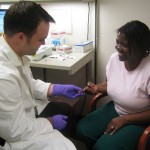A CALIFORNIA LAW THAT GOES INTO EFFECT this summer strengthens the state’s previous requirement for acute care hospitals to practice antimicrobial stewardship.
Starting July 1, acute care hospitals in California must put into effect antimicrobial stewardship programs that follow federal and professional society guidelines and include a process to evaluate the judicious use of antimicrobials. The law specifies that the stewardship teams must be multidisciplinary and include “at least one physician or pharmacist” who has expertise and training in antimicrobial stewardship.
California is the only state that has enacted legislation mandating antimicrobial stewardship for hospitals.
The law, which was passed last September, supplements legislation from 2006 that mandates stewardship programs for California’s acute care hospitals and requires the state health department to assess them for compliance.
The older law required hospitals to “develop a process for evaluating the judicious use of antibiotics” but didn’t define the process.
As a result, said Olga DeTorres, infectious diseases (ID) clinical pharmacist at Palomar Medical Center in Escondido, “hospital administrators have been very creative in what they define as antibiotic stewardship.”
DeTorres serves on the antimicrobial stewardship subcommittee of the state health department’s Healthcare Associated Infections Advisory Committee. She said many hospitals in the state have not invested in hiring staff to perform tasks like chart reviews and prescriber follow-up and education to improve antimicrobial use.
“Many hospitals just leave it up to the pharmacist to do it at the end of the day, if they get caught up with their work,” she said.
About half of the 233 California acute care hospitals that responded to a state health department survey during 2010–11 reported having a stewardship program, according to a report published in the April 2013 issue of Infection Control and Hospital Epidemiology.
The report stated that 20% of the survey respondents either did not plan to implement a stewardship program or were uncertain of their ability to do so. Among these respondents, 47% cited staffing constraints and 42% named lack of funding as barriers to implementing stewardship programs.
Nonfederal U.S. hospitals in 2012 spent about $375 billion on antibacterial, antifungal, and non-HIV antiviral drugs, according to the 2014 version of AJHP‘s annual article on national trends in prescription drug expenditures [see March 15, 2014, AJHP Special Feature].
DeTorres said California did the right thing by mandating antimicrobial stewardship in order to decrease antimicrobial use and combat the spread of antimicrobial-resistant bacteria.
At Palomar, she said, antimicrobial stewardship is an interdisciplinary project carried out with strong support from the hospital administration and a “physician champion” who fully supports DeTorres’s efforts.
Those efforts include running daily reports on all inpatients who are receiving an antimicrobial and checking culture and susceptibility test results to determine whether the appropriate agent was selected.
DeTorres said Palomar’s antimicrobial prescribing is mostly automated, thanks to a large front-end investment in medication-use and drug-susceptibility evaluations and the development of treatment guidelines endorsed by the hospital’s medical departments.
“All the physician has to do is type in the infection—urinary tract infection, pneumonia, cellulitis—and they’ll get a drop-down box with the preferred agents,” DeTorres said.
If a prescriber strays from the recommendations, “I leave electronic notes for the physician and then . . . I go upstairs to hunt down the physician and persuade him or her to switch to what was suggested,” DeTorres said.
She said Palomar’s stewardship program follows Infectious Diseases Society of America (IDSA) guidelines, with modifications on the basis of the hospital’s antimicrobial susceptibility data.
Palomar is one of about three dozen hospitals that have shared their stewardship progress through the state’s online Antimicrobial Stewardship Spotlight program. Twelve hospitals, including Palomar, have met all 11 predefined criteria for an advanced stewardship program, according to the website.
“Our stewardship program is so successful, we’ve actually seen, since we’ve implemented it, a reversal of the increasing trend of resistance—we’ve seen susceptibility improve in many situations. So we’re able to use much narrower-spectrum antibiotics,” said Jeremy Lee, interim district director of pharmacy services for Palomar Health.
The Centers for Disease Control and Prevention (CDC) strongly encourages all hospitals to implement evidence-based antimicrobial stewardship practices.
“We shouldn’t accept inappropriate antibiotic prescribing from a person who should know better, just as we should never accept someone not washing their hands before they touch a patient,” said Arjun Srinivasan, associate director for CDC’s Healthcare Associated Infection Prevention Programs, during a January 22 antimicrobial stewardship webinar.
Srinivasan said that despite good evidence that strong antimicrobial stewardship programs work and are cost-effective, many hospitals have not implemented the programs.
“When we go talk to people, we oftentimes hear, ‘This is not a priority for us, because it’s not required by anyone,'” Srinivasan said.
That could be changing.
President Obama issued an executive order last September requiring the Department of Health and Human Services to work toward mandating that hospitals implement strong antimicrobial stewardship programs.
Tied to the executive order was the September 2014 “Report to the President on Combating Antibiotic Resistance.” The report urges that the Centers for Medicare and Medicaid Services (CMS), by the end of 2017, require U.S. hospitals to implement evidence-based antimicrobial stewardship programs in order to participate in Medicare and Medicaid.
Private-sector organizations, led by IDSA and the Society for Healthcare Epidemiology of America (SHEA), had previously asked CMS to make antimicrobial stewardship a condition of participation (CoP) in Medicare and Medicaid.
A CMS spokesman stated that the agency is “looking at” this issue but cannot comment on it specifically during the rulemaking process.
Christopher Topoleski, ASHP’s director for federal regulatory affairs, said ASHP consulted with “relevant stakeholders” and opted not to endorse the IDSA–SHEA letter.
“While we would agree with the importance of having antimicrobial stewardship programs in hospitals, having it be a CoP in Medicare may make it more difficult for hospitals to tailor the programs to their specific needs,” Topoleski said. “One alternative approach could be to house it within the Joint Commission; that way, it would allow for more flexibility.”
Kasey Thompson, ASHP’s vice president for policy, planning, and communications, noted that if CMS mandates antimicrobial stewardship for hospitals, this would present a major opportunity for pharmacists to lead their hospitals’ stewardship programs.
–By Kate Traynor, reprinted with permission from AJHP
(March 1, 2015; volume 72, pages 338-340)








 If you want to contribute tutorials, news or other stuff please contact us. We pay 150 for each approved article.
If you want to contribute tutorials, news or other stuff please contact us. We pay 150 for each approved article. Consectetur adipisicing elit. Sed do eiusmod tempor incididunt ut labore.
Consectetur adipisicing elit. Sed do eiusmod tempor incididunt ut labore. This site uses valid HTML and CSS. All content Copyright © 2010 Newscast, Inc
This site uses valid HTML and CSS. All content Copyright © 2010 Newscast, Inc If you like what we do, please don't hestitate and subscribe to our
If you like what we do, please don't hestitate and subscribe to our